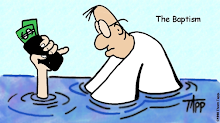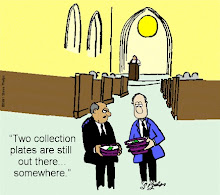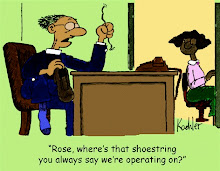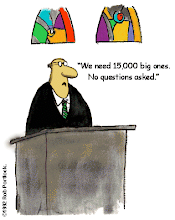Sunday, March 2, 2008
Helpful Hints
Are there some helpful hints that you've learned to help you tithe and connect meaning to your giving? A prayer journal? A journal for recording thanksgivings? Thanking God for at least 3 blessings every time you drop your check in the offering plate? Doing your banking online and having your tithe check sent automatically every pay period? These or any other helpful hints. Click the "COMMENTS" tab below and share your helpful hints.
Subscribe to:
Post Comments (Atom)






9 comments:
Visit www.realrelationships.com for several helpful resources such as:
A. A helpful budget in the "Downloads" section
B. 2 minute video answers to common finance questions in the "Video Channels" section. http://www.realrelationships1.com/FN.php
Join a Financial Peace University class if you see no way to tithe. You will learn how you can tithe and a whole lot more.
I TOTALLY agree with Financial Peace University. So many from our church have experienced great results personally. Our church offers FPU. Many others do too. Learn more at www.daveramsey.com
An email I received today had the following helpful hints about the "envelope method" of money management. - Pastor Brent
I don't believe that God owes us for our obedience. And, to me, tithing is an obedience issue. However, with that said, I KNOW that God will help us to
budget the remainder. Another way to look at is that if one does not budget, tithing may cause one to begin to budget which ia certainly getting
a handle on your finances. Long before Dave Ramsey's theory, which is very sound, my Dad taught me how to budget using the envelope method. I always had the correct change in white envelopes for whatever needs [for which I budgeted, even] .....Lunch money, fees, whatever.
I planned ahead.
From my friend Bart Stone, pastor of Momentum Christian Church in Atlanta, GA.
http://www.momentumcc.org/
I suggest Andy Stanley's book, "Fields of Gold." It's a good resource.
Bart
Since tithing is an investment in the future and helps us lift our heads toward what is to come, I suggest making a list each day of things we're looking forward to.
Try these websites for personal and small group help:
http://www.crown.org/
http://www.saddlebackresources.com/en-US/SmallGroups/ChristianLiving/ManagingOurFinances.htm
Another good website is
www.generousgiving.org
Article from the Associated Press:
Science, Bible Agree: Giving Is Better
WASHINGTON - The Bible counsels misers that it's better to give than to receive. Science agrees. People who made gifts to others or to charities reported they were happier than folks who didn't share, according to a report in Friday's issue of the journal Science.
While previous studies have shown that having more money can increase happiness, the researchers at the University of British Columbia and Harvard University wondered if the way people spent their money made any difference.
Turns out, it does.
Lead researcher Elizabeth W. Dunn, an assistant professor of psychology at the University of British Columbia, said she wasn't surprised that doing something for others made people happy.
But she was struck by how big the effect was and that how people spent money was more important than how much money they had.
"This work suggests that even making small alterations in how we spend money on a daily basis can make a difference in happiness," Dunn said in a telephone interview.
"That doesn't mean go get a high paying job so you can spend tons of money on others. The message is, given what you have, how can you make little alterations to do something for others," she said.
And, she added, "there's nothing special about money," giving can involve time or special skills to help other people.
The report didn't surprise Sue Citro, senior digital membership manager for the Nature Conservancy:
"We do hear from our members and our supporters that the do get a real feeling of satisfaction from knowing their giving is doing good," she said.
Andrea Koslow, director of advertising at the American Red Cross, said: "The act of helping has its own profound effect."
"People need a humanitarian outlet ... feeling that they make a difference ... that's very motivating," Koslow said.
The good feeling associated with giving is why workplace charity opportunities can engage employees and lift morale, added Kristine Templin, director of corporate partnerships at the American Red Cross.
The researchers started by asking a sample of 632 Americans, 55 percent of whom were women, to rate their happiness on a scale of 1 to 5, the higher the number the happier.
Then they asked the participants to report their annual income and estimate how much they spent on paying bills, buying gifts for themselves, buying gifts for others and giving to charity.
The first two were considered personal spending and averaged $1,714-a-month, the second two were termed "prosocial" spending and averaged $146-a-month.
"Personal spending was unrelated to happiness," said the researchers. "But higher prosocial spending was associated with significantly greater happiness," they found.
Not content with that, they then studied 16 employees of a company in Boston, asking about their happiness one month before and six to eight weeks after each received a profit-sharing bonus from their employer.
In the second interview they also asked about personal and prosocial spending and once again those who spent more on others were happier.
"The manner in which they spent that bonus was a more important predictor of their happiness than the amount of the bonus itself," the researchers found.
Finally, 46 Canadian students were asked to rate their happiness and then each was given a random envelope containing money, ranging from $5 to $20. Some were instructed to spend it on themselves, others were told to buy a gift for someone else.
At 5 p.m. that day, they were called together again and asked to rate their happiness.
The amount of money had no impact on happiness, but those assigned to buy something for another person reported greater happiness than those told to get something for themselves, the researchers said.
A separate study published in 2006 in the journal Proceedings of the National Academy of Sciences found that the same parts of the brain that produce the good feeling when a person receives a reward also respond when they give to someone else.
Indeed, researchers led by Jordan Grafman at the National Institutes of Health found the reward areas were more active when giving a gift than when receiving one.
Associated Press Writer Natasha Metzler contributed to this report.
Science: http://www.sciencemag.org
A service of the Associated Press(AP
Post a Comment